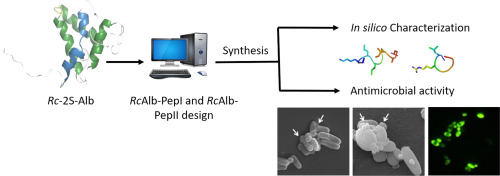当前位置:
X-MOL 学术
›
BBA Biomembr.
›
论文详情
Our official English website, www.x-mol.net, welcomes your feedback! (Note: you will need to create a separate account there.)
RcAlb-PepII, a synthetic small peptide bioinspired in the 2S albumin from the seed cake of Ricinus communis, is a potent antimicrobial agent against Klebsiella pneumoniae and Candida parapsilosis.
Biochimica et Biophysica Acta (BBA) - Biomembranes ( IF 3.4 ) Pub Date : 2019-10-31 , DOI: 10.1016/j.bbamem.2019.183092 Lucas P Dias 1 , Pedro F N Souza 1 , Jose T A Oliveira 1 , Ilka M Vasconcelos 1 , Nadine M S Araújo 1 , Mauricio F V Tilburg 2 , Maria I F Guedes 2 , Rômulo F Carneiro 3 , José L S Lopes 4 , Daniele O B Sousa 1
Biochimica et Biophysica Acta (BBA) - Biomembranes ( IF 3.4 ) Pub Date : 2019-10-31 , DOI: 10.1016/j.bbamem.2019.183092 Lucas P Dias 1 , Pedro F N Souza 1 , Jose T A Oliveira 1 , Ilka M Vasconcelos 1 , Nadine M S Araújo 1 , Mauricio F V Tilburg 2 , Maria I F Guedes 2 , Rômulo F Carneiro 3 , José L S Lopes 4 , Daniele O B Sousa 1
Affiliation

|
Antimicrobial peptides (AMPs) are important constituents of the innate immunity system of all living organisms. They participate in the first line of defense against invading pathogens such as viruses, bacteria, and fungi. In view of the increasing difficulties to treat infectious diseases due to the emergence of antibiotic-resistant bacterial strains, AMPs have great potential to control infectious diseases in humans and animals. In this study, two small peptides, RcAlb-PepI and RcAlb-PepII, were designed based on the primary structure of Rc-2S-Alb, a 2S albumin from the seed cake of Ricinus communis, and their antimicrobial activity assessed. RcAlb-PepII strongly inhibited the growth of Klebsiella pneumoniae and Candida parapsilosis, and induced morphological alterations in their cell surface. C. parapsilosis exposed to RcAlb-PepII presented higher cell membrane permeabilization and elevated content of reactive oxygen species. RcAlb-PepII also degraded and reduced the biofilm formation in C. parapsilosis and in K. pneumonia cells. Experimentally, RcAlb-PepII was not hemolytic and had low toxicity to mammalian cells. These are advantageous characteristics, which suggest that RcAlb-PepII is safe and apparently effective for its intended use and has great potential for the future development of an antimicrobial agent with the ability to kill or inhibit K. pneumoniae and C. parapsilosis cells.
中文翻译:

RcAlb-PepII是一种从小蓖麻(Ricinus communis)的种子饼中受到2S白蛋白生物启发的合成小肽,是一种有效的抗肺炎克雷伯菌和副念珠菌的抗菌剂。
抗菌肽(AMPs)是所有活生物体先天免疫系统的重要组成部分。他们参与了抵御病毒,细菌和真菌等病原体入侵的第一道防线。鉴于由于抗生素抗性细菌菌株的出现导致治疗传染病的难度越来越大,AMP具有控制人和动物的传染病的巨大潜力。在这项研究中,基于Rc-2S-Alb(来自蓖麻的种子饼中的2S白蛋白)的一级结构,设计了两种小肽RcAlb-PepI和RcAlb-PepII,并评估了它们的抗菌活性。RcAlb-PepII强烈抑制肺炎克雷伯菌和副念珠菌的生长,并诱导其细胞表面的形态变化。C。暴露于RcAlb-PepII的副寄生虫表现出更高的细胞膜通透性和活性氧含量的升高。RcAlb-PepII还可以降解并减少副寄生念珠菌和肺炎克雷伯菌细胞中生物膜的形成。实验上,RcAlb-PepII不溶血,对哺乳动物细胞毒性低。这些是有利的特征,这表明RcAlb-PepII对于其预期用途是安全的,并且显然有效,并且对于具有杀灭或抑制肺炎克雷伯菌和副肺炎衣原体细胞能力的抗微生物剂的未来开发具有很大的潜力。RcAlb-PepII不溶血,对哺乳动物细胞毒性低。这些是有利的特征,这表明RcAlb-PepII对于其预期用途是安全的,并且显然有效,并且对于具有杀灭或抑制肺炎克雷伯菌和副肺炎衣原体细胞能力的抗微生物剂的未来开发具有很大的潜力。RcAlb-PepII不溶血,对哺乳动物细胞毒性低。这些是有利的特征,这表明RcAlb-PepII对于其预期用途是安全的,并且显然是有效的,并且对于具有杀灭或抑制肺炎克雷伯氏菌和副纤毛衣原体细胞能力的抗微生物剂的未来开发具有很大的潜力。
更新日期:2019-11-01
中文翻译:

RcAlb-PepII是一种从小蓖麻(Ricinus communis)的种子饼中受到2S白蛋白生物启发的合成小肽,是一种有效的抗肺炎克雷伯菌和副念珠菌的抗菌剂。
抗菌肽(AMPs)是所有活生物体先天免疫系统的重要组成部分。他们参与了抵御病毒,细菌和真菌等病原体入侵的第一道防线。鉴于由于抗生素抗性细菌菌株的出现导致治疗传染病的难度越来越大,AMP具有控制人和动物的传染病的巨大潜力。在这项研究中,基于Rc-2S-Alb(来自蓖麻的种子饼中的2S白蛋白)的一级结构,设计了两种小肽RcAlb-PepI和RcAlb-PepII,并评估了它们的抗菌活性。RcAlb-PepII强烈抑制肺炎克雷伯菌和副念珠菌的生长,并诱导其细胞表面的形态变化。C。暴露于RcAlb-PepII的副寄生虫表现出更高的细胞膜通透性和活性氧含量的升高。RcAlb-PepII还可以降解并减少副寄生念珠菌和肺炎克雷伯菌细胞中生物膜的形成。实验上,RcAlb-PepII不溶血,对哺乳动物细胞毒性低。这些是有利的特征,这表明RcAlb-PepII对于其预期用途是安全的,并且显然有效,并且对于具有杀灭或抑制肺炎克雷伯菌和副肺炎衣原体细胞能力的抗微生物剂的未来开发具有很大的潜力。RcAlb-PepII不溶血,对哺乳动物细胞毒性低。这些是有利的特征,这表明RcAlb-PepII对于其预期用途是安全的,并且显然有效,并且对于具有杀灭或抑制肺炎克雷伯菌和副肺炎衣原体细胞能力的抗微生物剂的未来开发具有很大的潜力。RcAlb-PepII不溶血,对哺乳动物细胞毒性低。这些是有利的特征,这表明RcAlb-PepII对于其预期用途是安全的,并且显然是有效的,并且对于具有杀灭或抑制肺炎克雷伯氏菌和副纤毛衣原体细胞能力的抗微生物剂的未来开发具有很大的潜力。


























 京公网安备 11010802027423号
京公网安备 11010802027423号